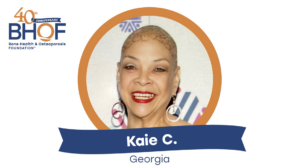Young and Fragile: My Battle with Early-Onset Osteoporosis

In my late 20s, a trip to the ER for a wrist fracture led to a series of surprising questions from social workers and police about domestic violence. The questioning stemmed from the fact that I had suffered over 20 fractures by that point in my life. Although there was no issue of domestic violence, this incident sparked a trail of medical tests that ultimately diagnosed me with osteopenia at the age of 27.
For those unfamiliar, osteopenia and osteoporosis are often considered “old lady diseases,” but there I was, a young woman with bone density scores that matched those of someone between 85 and 95 years old. A DEXA scan revealed my spine had a T-score of -5.1, and my right femur had a T-score of -2.6. These scores were alarming and meant I had to be extremely cautious with my daily activities to avoid fractures.
My journey included entering a painful and somewhat successful drug therapy. However, I was initially skeptical and didn’t start treatment until my early 50s. At that point, my diagnosis was updated to full-blown osteoporosis. Fortunately, this therapy helped me increase my bone mass, with my latest DEXA scan showing improved scores: -3.0 for my spine and -2.4 for my femur. While progress has been made, I may never be able to return to a fully physical lifestyle comparable to others in my age bracket.
Living with osteoporosis means constant adjustments. I cannot lift over 10 pounds, and I have to carefully navigate my home to avoid falls. Weight-bearing exercises and water aerobics have become essential parts of my routine to help maintain my bone health.
Working at the Black Women’s Health Imperative has given me an opportunity to share my story and raise awareness about this important health issue. Angela F. Ford, PhD, EVP, Chronic Disease Management at BWHI encouraged me to join the Bone Health Coalition and participate in their 40 Faces of Osteoporosis video series. This opportunity allowed me to share my experience and emphasize that osteoporosis isn’t just a disease for older white women—it can affect all women, at any age.
What I now know is that it’s crucial for everyone to have a bone density test and to be aware of their bone health, regardless of age or ethnicity. Early detection and proactive management can make a significant difference. Remember, osteoporosis can impact anyone, so stay informed and take care of your bones!
Click Here to watch the 40 Faces of Osteoporosis series.
For more information about bone health visit The Coalition to Strengthen Bone Health https://bit.ly/bonehealthinstitute
*Each Year May is Bone Health Awareness Month

